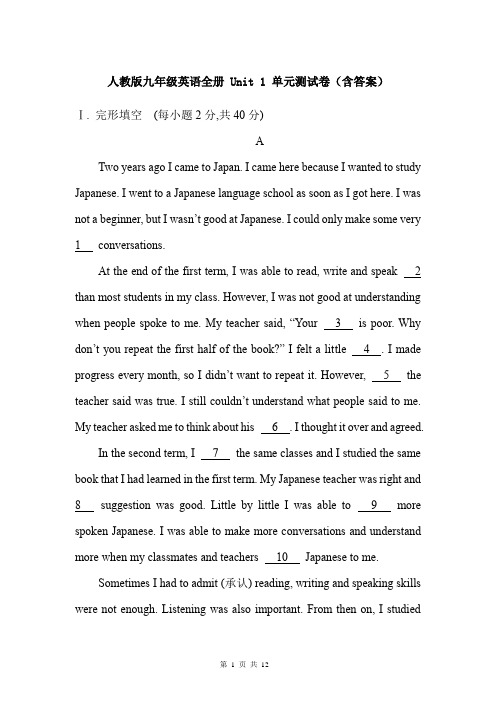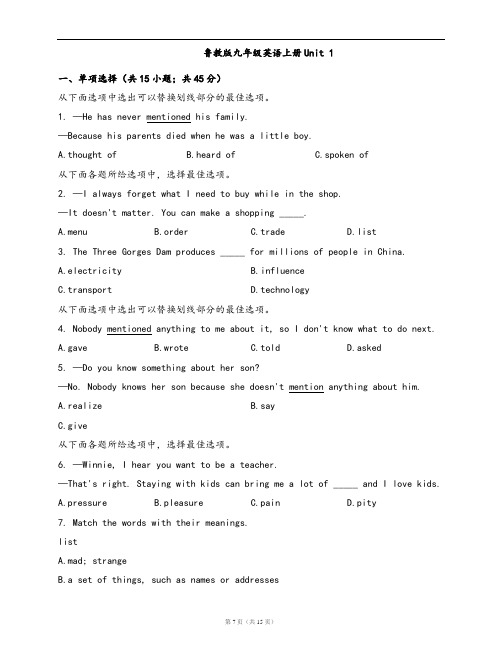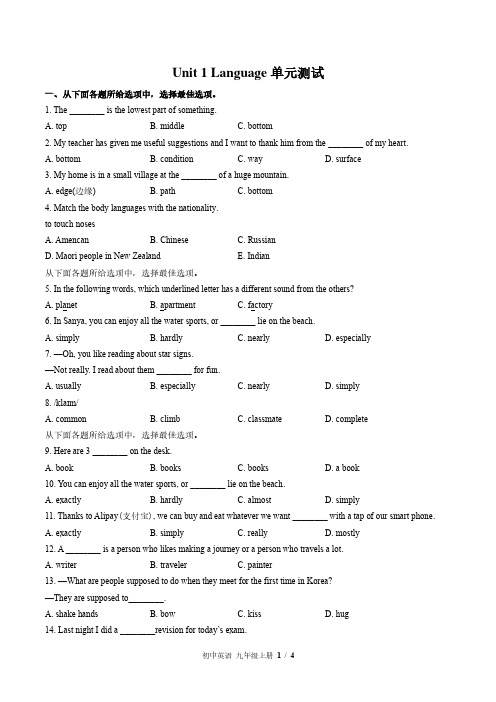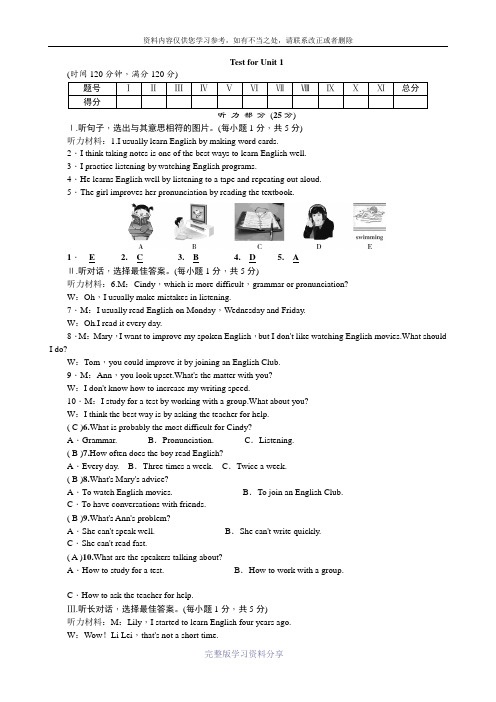9B Unit1单元测试卷含答案
人教版九年级全册英语Unit1单元测试卷(Word版,含答案)

人教版九年级全册英语Unit1单元测试卷(81小题,满分120分,考试用时90分钟)一、听说应用(本大题共30小题,每小题1分,共30分;A、B、C、D部分为听力理解,E部分为情景对话)A.听句子(本题共5小题,每小题1分,共5分)请根据所听内容,选择符合题意的图画回答问题,并将最佳选项的字母编号填写在题前括号内。
每个句子听两遍。
()1.How does the speaker like learning English?()2.What subject does Anna help the speaker?()3.What did the speaker put on the desk?()4.What’s the speaker’s advice?()5.What is a good way to learn English?B.听对话(本题共10小题,每小题1分,共10分)请根据每段对话的内容回答问题,从每小题所给的三个选项中选出一个最佳答案,并将最佳选项的字母编号填写在题前括号内。
每段对话听两遍。
听第一段对话,回答第6小题。
()6.What was the girl doing at 10:00 last night?A.Watching TV.B.Studying for a test.C.Reading an English magazine.听第二段对话,回答第7小题。
()7.Which is the boy’s favorite subject?A.History.B.Science.C.Math.听第三段对话,回答第8小题。
()8.Where are they talking?A.In the street.B.In a library.C.In a shop.听第四段对话,回答第9小题。
()9.How does the girl usually study English?A.By asking the teacher for help.B.By listening to tapes.C.By working with her friends.听第五段对话,回答第10小题。
人教版九年级英语全册 Unit 1 单元测试卷(含答案)

人教版九年级英语全册 Unit 1 单元测试卷(含答案)Ⅰ. 完形填空(每小题2分,共40分)ATwo years ago I came to Japan. I came here because I wanted to study Japanese. I went to a Japanese language school as soon as I got here. I was not a beginner, but I wasn’t good at Japanese. I could only make some very 1 conversations.At the end of the first term, I was able to read, write and speak 2 than most students in my class. However, I was not good at understanding when people spoke to me. My teacher said, “Your 3 is poor. Why don’t you repeat the first half of the book?” I felt a little 4 . I made progress every month, so I didn’t want to repeat it. However, 5 the teacher said was true. I still couldn’t understand what people said to me. My teacher asked me to think about his 6 . I thought it over and agreed.In the second term, I 7 the same classes and I studied the same book that I had learned in the first term. My Japanese teacher was right and 8 suggestion was good. Little by little I was able to 9 more spoken Japanese. I was able to make more conversations and understand more when my classmates and teachers 10 Japanese to me.Sometimes I had to admit (承认) reading, writing and speaking skills were not enough. Listening was also important. From then on, I studiedharder to improve my listening skill.1. A. difficult B. simple C. quick D. slow2. A. worse B. more C. better D. less3. A. reading B. writing C. listening D. speaking4. A. proud B. angry C. relaxed D. moved5. A. when B. how C. which D. what6. A. suggestion B. secret C. activity D. chance7. A. forgot B. repeated C. left D. increased8. A. his B. her C. their D. your9. A. notice B. understand C. add D. teach10. A. joined B. lent C. played D. spokeBAs a university student, I decided to learn German. I really liked the language, but I was not very good at learning it. The grammar 11me a lot and even drove me crazy. My only 12was listening—I always got an “A”. After two yea rs of study, I struggled (挣扎) to communicate in 13German and signed up (报名) to study in Germany to complete my degree. It was the hardest term I would ever have.The moment I 14Germany, I felt like I was starting from the beginning. The German I'd learned in university wasn't 15for everyday conversation. I was often nervous at school and I was 16my teachers. They always asked me some questions that I didn't understand.I only relaxed a little around my eightroommates, who were willing to speak German slowly to me and didn't seem to mind my 17.I chose to study three courses and the history class was the worst among them. The teacher spoke so 18that almost everything he said flew right over my head. I sat in the front, took notes and even recorded every single 19he said in class, but nothing helped.Years have passed, 20I still remember how it felt. That trip was a difficult but valuable lesson. I think my failure that term taught me just as much as my success.11.A.gave B.helped C.troubled D.saved12.A.action B.article C.agreement D.advantage13.A.perfect B.broken C.beautiful D.harmful14.A.arrived in B.handed in C.succeeded in D.took in15.A.peaceful B.painful eful D.careful16.A.pleased with B.angry with C.excited about D.afraid of17.A.purposes B.progress C.mistakes D.achievements18.A.slowly B.quickly C.clearly D.suddenly19.A.word B.book C.passage D.excuse20.A.and B.so C.but D.becauseⅡ.阅读理解(每小题2分,共20分)AChinese is getting more and more popular, so the UK government plans to invest (投资) 10 million pounds to help more kids learn Chinese. Do you think it is necessary for UK pupils to learn Chinese?Seneca (Canada)I studied French for 2 years in high school, and German for 4 years in college and got good marks. I studied Chinese for about 4 months before moving to China. For any language, if you don't use it, it will be easy to lose it. I've forgotten the French I learned except for a few phrases. I speak Chinese every day. My writing, reading and listening are quite good, but far from fluent. I think it's necessary to learn Chinese.Tony (the UK)Learning any language can be valuable, but it is not suitable for everyone. Chinese is a difficult language to learn, and teachers in the UK are not good at teaching foreign languages. However, China is a big and developing market for English business people. For them, Chinese is worth learning.Bill (the US)I don't think Chinese will replace (取代) English. Chinese is difficult to learn. To learn Chinese, you have to learn how to write and read it carefully. In the future Chinese will become more popular, so I think learning Chinese is a good thing.(E9301003)21.Seneca learnt German for .A.2 yearsB.4 monthsC.4 yearsD.6 years22.The underlined word “fluent” means “” in Chinese.A.糟糕的B.流利的C.完美的D.成熟的23.Tony thinks it's to learn Chinese.A.easyB.difficultelessD.interesting24.From the passage we know .A.Bill doesn't think Chinese will replace English in the futureB.Bill thinks it is easy to learn ChineseC.teachers in the UK are very good at teaching ChineseD.Seneca is very good at speaking Chinese25.What's the best title for the passage?A.How to learn Chinese wellB.Chinese is difficult to learnC.Do you like Chinese?D.Is it necessary to learn Chinese?BPerhaps you've seen the English letters “WC” in your city. They show public toilets. But do you know the expression is far from elegant (优雅的) English? In fact, foreigners from English⁃speaking countries rarely use the letters.Workers in our city are changing “WC” signs all over the city. The government is spending much money changing all the bad English on signs and restaurant menus. Many other places in China are following suit(照着做).“WC, or water closet, is old⁃fashioned English. It sounds dirty to me,” says Charlie Shifflet, a young man from the US. The old sign will become “Gents/Men” and “Ladies/Women”.“I see lots of poor English in everyday life, not only on signs,” he says. “I know what they mean. But they are Chinglish (中国式英语), not real English. For example, when someone says to me ‘My hometown is Henan Province.’ I know he should say, ‘My hometown is in Henan Province.’ ‘Hometown’ is a smaller place in a province.” The common mistakes he picked up include “Not Entry”, which should be “No Entry”. “Direction of Airport” should be changed into “To the Airport”. And it is “room rate”, not “room price”. And remember to “Keep off the grass”, rather than “Care of the green”. (E9301003)26.What does the writer think of the use of “WC”?A.He doesn't think it means “water closet”.B.He doesn't think it is old⁃fashioned English.C.He doesn't think it is proper for a sign.D.He thinks it is elegant English.27.The underlined word “rarely” means “”.A.sometimesB.seldomC.oftenD.always28.Charlie Shifflet .A.is a Chinese living in AmericaB.sometimes uses ChinglishC.likes to hear or see ChinglishD.thinks Chinese people sometimes use incorrect English29.The last paragraph is about .A.why there are so many Chinglish signsB.examples of ChinglishC.where Chinglish signs areD.who uses Chinglish signs30.We can read the passage from a magazine called “”.nguage LearningB.American HistoryC.Different CountriesD.Chinese CultureⅢ.语篇填空(每空2分,共20分)从方框中选择适当的词并用其正确形式填空,使短文通顺、意思完整。
鲁教版九年级英语上册单元测试卷Unit 1(word版,含答案解析)

鲁教版九年级英语上册Unit 1一、单项选择(共15小题;共45分)从下面选项中选出可以替换划线部分的最佳选项。
1. —He has never mentioned his family.—Because his parents died when he was a little boy.A.thought ofB.heard ofC.spoken of从下面各题所给选项中,选择最佳选项。
2. —I always forget what I need to buy while in the shop.—It doesn't matter. You can make a shopping _____.A.menuB.orderC.tradeD.list3. The Three Gorges Dam produces _____ for millions of people in China.A.electricityB.influenceC.transportD.technology从下面选项中选出可以替换划线部分的最佳选项。
4. Nobody mentioned anything to me about it, so I don't know what to do next.A.gaveB.wroteC.toldD.asked5. —Do you know something about her son?—No. Nobody knows her son because she doesn't mention anything about him.A.realizeB.sayC.give从下面各题所给选项中,选择最佳选项。
6. —Winnie, I hear you want to be a teacher.—That's right. Staying with kids can bring me a lot of _____ and I love kids.A.pressureB.pleasureC.painD.pity7. Match the words with their meanings.listA.mad; strangeB.a set of things, such as names or addressesC.a document which you show when you enter a foreign countryD.the number you get when you add several numbers togetherE.someone who invites guests to a meal or to stay in his home从下面各题所给选项中,选择最佳选项。
九年级英语人教版单元测试Unit 1 04 试题试卷练习含答案

单元测试Unit1 How can we become good learners?一、单项填空。
( )1. —Could you please show me _______ an e-mail?—Sure. It's easy to do it.A. when to sendB. to how sendC. to where sendD. how to send( )2. Nobody is born ________ the ability to know all the things.A. inB. withC. forD. to( )3. The boy often makes mistakes _______ spelling.A. atB. byC. inD. with( )4. I got her umbrella _______ mistake.A. byB. inC. onD. at( )5. He always learns by himself. He never ________ others.A. depends onB. keeps onC. goes onD. carries on ( )6. Have you ________ who broke this window?A. taken outB. put outC. looked outD. found out ( )7. —Do you often study with a group?—Yes. I find______________ really helpful to study that way.A. itB. thatC. thisD. them( )8. I didn't know______________ to London.A. how to goB. where to goC. what to goD. how go( )9.Mary and Kathleen are talking a low voice.A.byB.inC.withD.for( )10.The music was beautiful she lost herself in it.A.too;toB.such;thatC.so;thatD.enough;to二、完成句子,词数不限。
九年级英语上学期 Unit1 单元测试卷(含答案)

九年级英语上学期 Unit 1 单元测试卷(含答案)本试卷共四大题,共9页,满分90分,考试时间90分钟一、语法选择(共15小题;每小题1分,满分15分)阅读下面短文,按照句子结构的语法性和上下文连贯的要求,从1~15各题所给的A、B、C和D项中选出最佳选项,并在答题卡上将该项涂黑。
Street art is a very popular form of art that is spreading quickly all over ___1___ world. You can find ___2___ on buildings, sidewalks and street signs. Now even art museum and galleries(美术馆)___3___ the works of street artists.People often have different opinions ___4___ street art. Some think it ___5___ a kind of destruction(破坏)but ___6___ think it is a very beautiful new form of culture.In the street art world, graffiti(涂鸦)can be ___7___. It began in New York. First some young people ___8___ words and images on the walls. They found the paintings could ___9___ their disagreements against society. Later, the colorful style of writing became ___10___ as graffiti.Street artists do their work for a reason. Some of ___11___ think they are closer to the people, while others try ___12___ their political opinions.In today’s world, the Internet has an ___13___ influence(影响)on street art. Artists ___14___ show their pictures to the audience. The street art movement lives with the energy and life of cities, ___15___ it will continue to change and grow.1. A. a B. an C. / D. the2. A. it B. one C. this D. that3. A. collects B. collected C. are collecting D. will collect4. A. about B. in C. at D. under5. A. was B. is C. were D. are6. A. others B. the other C. another D. other7. A. popular B. more popular C. most popular D. the most popular8. A. paint B. painted C. have painted D. were painted9. A. showed B. shown C. show D. shows10. A. know B. knowing C. knew D. known11. A. they B. them C. their D. themselves12. A. express B. to expressing C. to express D. to be expressed13. A. amaze B. amazing C. amazed D. amazingly14. A. should B. need C. will D. can15. A. so B. but C. or D. because二、完形填空(共10小题;每小题1分,满分10分)阅读下面短文,掌握其大意,然后从16~25各题所给的A、B、C和D项,选出最佳选项,并在答题卡上将该项涂黑。
北师大版初中英语九年级Unit1单元测试试卷-含答案01

Unit 1 Language单元测试一、从下面各题所给选项中,选择最佳选项。
1. The ________ is the lowest part of something.A. topB. middleC. bottom2. My teacher has given me useful suggestions and I want to thank him from the ________ of my heart.A. bottomB. conditionC. wayD. surface3. My home is in a small village at the ________ of a huge mountain.A. edge(边缘)B. pathC. bottom4. Match the body languages with the nationality.to touch nosesA. AmencanB. ChineseC. RussianD. Maori people in New ZealandE. Indian从下面各题所给选项中,选择最佳选项。
5. In the following words, which underlined letter has a different sound from the others?A. planetB. apartmentC. factory6. In Sanya, you can enjoy all the water sports, or ________ lie on the beach.A. simplyB. hardlyC. nearlyD. especially7. —Oh, you like reading about star signs.—Not really. I read about them ________ for fun.A. usuallyB. especiallyC. nearlyD. simply8. /klaɪm/A. commonB. climbC. classmateD. complete从下面各题所给选项中,选择最佳选项。
人教版九年级初三英语Unit-1-单元测试卷(含答案)

Test for Unit 1(时间120分钟,满分120分)题号ⅠⅡⅢⅣⅤⅥⅦⅧⅨⅩⅪ总分得分听力部分(25分)Ⅰ.听句子,选出与其意思相符的图片。
(每小题1分,共5分)听力材料:1.I usually learn English by making word cards.2.I think taking notes is one of the best ways to learn English well.3.I practice listening by watching English programs.4.He learns English well by listening to a tape and repeating out aloud.5.The girl improves her pronunciation by reading the textbook.1.__E__ 2.__C__ 3.__B__ 4.__D__ 5.__A__Ⅱ.听对话,选择最佳答案。
(每小题1分,共5分)听力材料:6.M:Cindy,which is more difficult,grammar or pronunciation?W:Oh,I usually make mistakes in listening.7.M:I usually read English on Monday,Wednesday and Friday.W:Oh.I read it every day.8.M:Mary,I want to improve my spoken English,but I don't like watching English movies.What should I do?W:Tom,you could improve it by joining an English Club.9.M:Ann,you look upset.What's the matter with you?W:I don't know how to increase my writing speed.10.M:I study for a test by working with a group.What about you?W:I think the best way is by asking the teacher for help.( C )6.What is probably the most difficult for Cindy?A.Grammar.B.Pronunciation.C.Listening.( B )7.How often does the boy read English?A.Every day. B.Three times a week. C.Twice a week.( B )8.What's Mary's advice?A.To watch English movies. B.To join an English Club.C.To have conversations with friends.( B )9.What's Ann's problem?A.She can't speak well. B.She can't write quickly.C.She can't read fast.( A )10.What are the speakers talking about?A.How to study for a test. B.How to work with a group.C.How to ask the teacher for help.Ⅲ.听长对话,选择最佳答案。
人教版九年级全一册英语unit 1单元测试卷(含答案)

人教版九年级全一册英语unit 1单元测试卷一. 单项选择从A、B、C、D四个选项中选择可以填入空白处的最佳答案。
( )1. Annie can dance very well. It seems that she was born _______ a great talent for dancing.A. inB. intoC. ofD. with( )2.—Wow, the train is moving at such a high _______!—Yes. It will take less time to go to Shanghai.A. speedB. placeC. riskD. spirit( )3. The two brothers are very different in character. One is quiet while the other is _______. A. shy B. active C. serious D. honest( )4. Du Ting plans to spend her lucky money _______. She will think twice before she buys things.A. easilyB. quicklyC. wiselyD. heavily( )5. We s hould learn from our mistakes so that we won’t _______ them.A. reviewB. repeatC. increaseD. include( )6._______ is meaningful to join the tree-planting club because we can help save the earth. A. It B. One C. This D. That( )7. Li Hua was _______ excited at the news _______ he jumped with joy.A. too; toB. enough; toC. such; thatD. so; that( )8. It’s never too old to learn. H er grandma learned how _______ some shopping on the Internet in her seventies.A. doB. doingC. to doD. done( )9.—Lucas, the math problem is very hard. _______ did you work it out?—By asking my father for help.A. WhereB. WhenC. WhyD. How( )10. Tina’s favorite hobby is reading. _______ she reads, _______ she becomes.A. The more; the happyB. The more; the happierC. The less; the happyD. The less; the happier( )11.—What do you think of your new English teacher?—She is kind and _______ us. We all like her.A. angry withB. patient withC. afraid ofD. tired of( )12.—Are you going to take a school trip next weekend?—I’m not sure. That _______ the weather.A. depends onB. tries onC. leads toD. belongs to( )13.—What should I do when I meet new words?—You should guess them first instead of _______ in the dictionary.A. cutting them upB. putting them upC. looking them upD. making them up( )14.—Can you draw the picture, Mike?—_______. I’m very good at drawing.A. Use it or lose itB. It serves you rightC. It’s a piece of cakeD. Knowledge comes from questioning( )15.—Learning a language is not easy. _______.—I agree. Rome wasn’t built in a day.A. It helps a lotB. It takes timeC. That’s interestingD. That sounds too bad二.用所给单词的适当形式填空。
- 1、下载文档前请自行甄别文档内容的完整性,平台不提供额外的编辑、内容补充、找答案等附加服务。
- 2、"仅部分预览"的文档,不可在线预览部分如存在完整性等问题,可反馈申请退款(可完整预览的文档不适用该条件!)。
- 3、如文档侵犯您的权益,请联系客服反馈,我们会尽快为您处理(人工客服工作时间:9:00-18:30)。
9B Unit1测试卷姓名 班级 得分第 I 卷(选择题 共60分)一、听力(共20分)第一部分 听对话回答问题(计10分)本部分共有10道小题,每小题你将听到一段对话,每段对话听两遍。
在听每段对话前,你 将有5秒钟的时间阅读题目;听完后,你还有5秒钟的时间选择你认为最合适的备选答案。
在听 到“嘀”的信号后,进入下一小题。
( ) 1. What are they talking about?A.B. C.() 2. Which place wo n‘t the boy go to today?A. B.C.( ) 3. What are they talking about?A.B. C.( ) 4. What is the boy doing?A. B.C.( ) 5. What does the woman say Mr Zhang can do in France? A. Talk with the local people. B. Learn French. C. Teach French. () 6. Why is Millie going to visit Hutongs in Beijing? A. Because she wants to live in a Hutong . B. Because she wants to learn more about Beijing. C. Because Hutongs are very famous in China. ( ) 7. Why is the woman moving house?A. She needs a quiet place.B. The new house is cheaper.C. She wants to live next to a singer.( ) 8. What does the man like?A. Thailand.B. Travelling.C. Spending holidays.( ) 9. What are they talking about?A. Weather.B. Seasons.C. The rain.( ) 10. Where is George‘s company?A. In America.B. In Japan.C. In China.第二部分听对话和短文回答问题(计10分)你将听到一段对话和两篇短文,各听两遍。
听每段对话或短文前,你将有时间阅读相关小题,每小题5秒钟;听完后,每小题你仍有5秒钟时间选择你认为最合适的备选答案。
听一段对话,回答第11–12小题。
答题完毕,请等待“嘀”的信号,进入第一篇短文。
( ) 11. What is the man reading?A. A magazine.B. A Chinese book.C. A newspaper.( ) 12. Where are they going at the weekend?A. Beijing Theatre.B. Beihai Park.C. Beihai Cinema.听第一篇短文,回答第13–15小题。
请根据短文内容,选择正确答案,完成信息记录表。
答题完毕,请等待“嘀”的信号,进入下一篇短文。
( ) 13. A. animal B. plant C. bird( ) 14. A. warm B. hot C. cool( ) 15. A. expensive B. comfortable C. cheap听第二篇短文,回答第16–20小题。
( ) 16. Who rang the doorbell of Mr White‘s house?A. Mr Black.B. Mrs Black.C. A young man.( ) 17. Mr White didn‘t go downstairs because .A.he didn‘t want to meet Mrs BlackB.his wife was downstairsC.he wa sn‘t feeling well( ) 18. Why didn‘t Mrs White answer Mr White at once?A.Because she didn‘t hear what her husband said.B.Because she didn‘t think that Mrs Black was foolish.C. Because she needed time to find a good answer.( ) 19. Where did Mrs White talk with Mrs Black?A. In her bedroom.B. In the living room.C. Beside the window.( ) 20. What do you think of Mrs White?A. Honest.B. A bit foolish.C. Clever.二、单项选择(共15分,每小题1分)( ) 21. It was very , but I was very happy because I got to the top of the mountain at last with my friends.A. tiredB. tiringC. interestedD. interesting( ) 22. The teacher came in, our exam papers in hand.A. withB. ofC. forD. under( ) 23. Tom, go to bed earlier. Tomorrow we‘ll have a long way .A. to goB. goC. wentD. gone( ) 24. you have known about it, I needn‘t tell you about it again.A. BeforeB. UnlessC. SinceD. Though( ) 25. We each other when he lived here. But he has moved to another city.A. used to meetB. have metC. are meetingD. has met( ) 26. Next to me , who was about seventy years old.A. an old man satB. did an old man sitC. sat an old manD. was an old man sitting( ) 27. Jack told me you bought a new mobile phone. May I have a look at ?A. oneB. the oneC. himD. it( ) 28. It‘s very kind you to give me so much help.A. forB. ofC. aboutD. with( ) 29. It was amazing I saw a film star when I did some shopping in a supermarket.A. whenB. howC. whereD. that( ) 30. Henry often helped his classmates, so he in the class meeting yesterday.A. was praisedB. is praisedC. praisedD. praises( ) 31. —we take a boat trip along the river?—Good idea. The landscape on both sides of the river is beautiful.A. MustB. ShallC. NeedD. Will( ) 32. —We are planning to go to the park on Sunday. ?—I‘m planning to visit the Science Museum.A. WhyB. Is that all rightC. What about youD. Aren‘t we( ) 33. This book was written by Mark is different from the one you read yesterday.A. whatB. whereC. whoD. that( ) 34. Don‘t you think necessary to go there by taxi?A. itB. thisC. usD. you( ) 35. Do you know ?A. that Mount Tai isB. that is Mount TaiC. where is Mount TaiD. where Mount Tai is三、完形填空(共10分,每小题1分)Alice and her best friend Judy have n‘t talked to each other for a few days. Last Saturday, Alice asked Judy to help with her maths homework, but Judy refused. Alice was very36 and decided not to talk to her any more.Alice is walking home from school when she sees a cool boy 37 the violin happily by the road. The music sounds so nice that she ca n‘t help 38 to listen to it. 39 Alice doesn‘t know what music it is, it makes her feel better. After the boy finishes playing, Alice walks over to him and says, ―Thank you 40 your beautiful music. It gets me out of the really bad mood.‖ Then she takes out some 41 and gives it to him. To her surprise, the boy asks her to take the money back. He explains that he i sn‘t making money by playing the violin. He just wants to 42 others. He hopes that the wonderful music can make people feel relaxed and happy. That‘s why he plays it by the road. What a 43 boy he is! Then Alice tells him about her problem.The boy says, ―You should learn to smile even if you are in difficulty. Listening to music is helpful. So why not listen to music as 44 as possible? Believe in your friend! She has her reasons. Believe in 45 ! Everything will go well!‖Hearing these words, Alice goes home with a smile. She believes she can make it.( ) 36. A. worried B. angry C. happy D. tired( ) 37. A. carrying B. selling C. buying D. playing( ) 38. A. stop B. stopping C. to stopping D. /( ) 39. A. Because B. When C. Though D. Whether( ) 40. A. for B. with C. from D. except( ) 41. A. music B. money C. food D. work( ) 42. A. have B. leave C. give D. help( ) 43. A. tall B. rich C. kind D. safe( ) 44. A. often B. quickly C. soon D. loudly( ) 45. A. myself B. herself C. yourself D. himself四、阅读理解(共15分,每小题1分)阅读下面短文,从短文后所给各题的四个选项(A、B、C和D)中,选出最佳选项。
